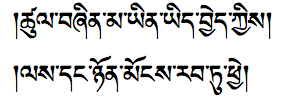Uttaratantra - Source of Karma and Mental Afflictions 1
 Here's verse 60 from Uttaratantra, rgyud bla ma, that has a concise description wherefrom las dang nyon mongs (karma and mental afflictions) arise.
Here's verse 60 from Uttaratantra, rgyud bla ma, that has a concise description wherefrom las dang nyon mongs (karma and mental afflictions) arise.We will start from the second line as it's easier to unravel this compressed verse from this end.
And yes, there's that las dang nyon mongs again. You will see this term many, many times in Buddhist texts, as a lot of the material is how to get rid of that plague.
The end has the expression rab tu phye. rab tu is another good word to learn inside out, it means completely, totally. When the Tibetan and Sanskrit scholars translated the Indian texts, they used this word when translating the Sanskrit verbal prefix pra (example: prabhava -> rab tu skye ba, total production, a term actually used when dividing the four noble truths to sixteen parts, hmm, should I go through that later...).
Note also that in verses sometimes words are added in for getting the same syllable account, like here seven syllables. It is actually not necessary to translate rab tu at all in this instance.
The verb phye here means gives rise to. So a rough translation so far is that something in the first line is what totally gives rise to karma and mental afflictions.
Those who study letters, take phye which is the last word one the second line. It's a nice way to see stacking in action. The root letter pha has a line on top changing it to phe, and then a yata at the bottom makes it phye.
